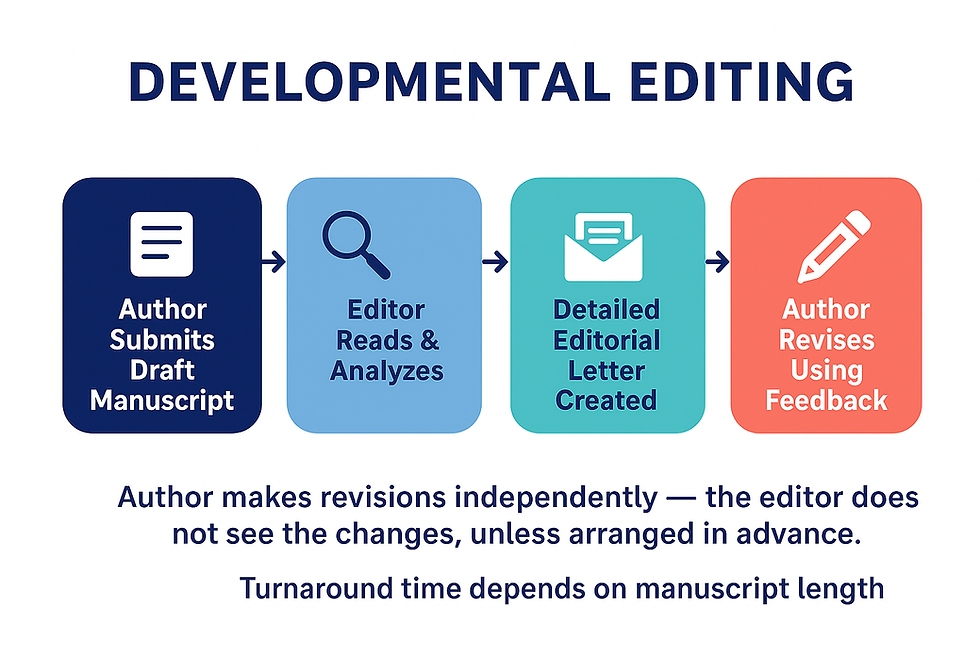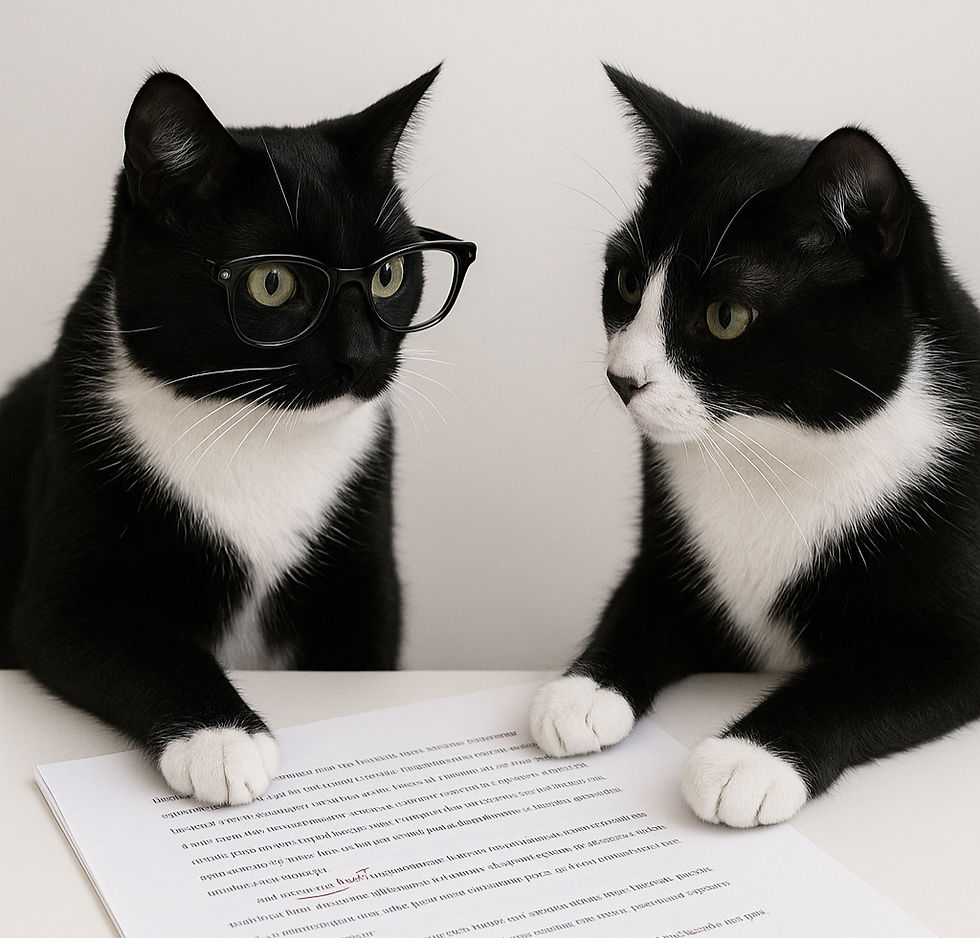What Is Developmental Editing? A Big-Picture Review to Strengthen Your Story
- lindaruggeri
- Sep 11, 2025
- 4 min read
Updated: Dec 5, 2025

Every manuscript is unique—which is exactly what makes writing both fascinating and, at times, overwhelming. As writers, it’s easy to get lost in the weeds of revising your own work without knowing where to focus. That’s where developmental editing comes in: a process designed to help you see your book as a whole and make sure the big picture is working before you fine-tune the smaller details. Sometimes you can do it alone or with your writer’s group, but sometimes it’s faster—and more thorough—when you enlist the help of a professional editor.
Think of it as taking a step back to view the entire garden, instead of crouching down to pull every last weed.
What Is Developmental Editing (Really)? 🧐
Developmental editing focuses on the big picture elements of your book. Instead of worrying about misspellings or commas, it looks at whether your manuscript works as a whole. Some of the areas it addresses:
Content and structure – Is everything in the right place?
Plot and pacing (for fiction) – Does the story move at the right rhythm?
Character development and arcs – Do characters evolve in believable, engaging ways?
Narrative flow and clarity – Is the writing clear and easy to follow? Does the book deliver what the introduction says it’s going to deliver?
Message and audience connection (for nonfiction) – Does your book communicate what you intend to the right readers? What is working, what isn’t, and above all, what needs to be done?

Setting Yourself Up for Success as a Writer 🏆
Before you begin revising—or before you hire an editor—take time to prepare. A little planning can prevent wasted effort and late-night frustration.
Ask yourself:
What does my manuscript need most right now? (Big-picture structure? Pacing? Voice? Flow?) It’s ok if you don’t know. Sometimes, when we’ve worked on a manuscript for so long, it’s hard to notice these things, so a writer’s group or an editor can help.
Where do I feel stuck? (Identifying this helps you focus your revision energy.)
What does the reader need/expect from this book?
What resources could I create to stay organized?
A list of characters and their arcs
A breakdown of themes and subthemes
Notes on weak spots I already see
By front-loading this preparation, you’ll make your revisions more purposeful—and if you decide to work with an editor, you’ll save time (and money) by giving them a clear starting point.
Tools and Systems That Help Writers Revise
You don’t need complicated software to self-edit, but having systems in place helps you track your progress and avoid getting stuck. Consider:
Book maps or outlines (to visualize your structure)
Word-count trackers (to see how balanced chapters are)
Flesch-Kincaid Reading Level (are you writing to your reader’s reading level?)
Chapter summaries (one-line descriptions that help you spot holes or tangents in your stories)
Notes and questions (keep a running list of what you need to revisit so you’re not derailed mid-revision)
These tools help you approach revision like an editor would—organized, intentional, and effective.
Knowing When You’re Done (For Now) 😮💨
Many of us struggle with the question: How many times should I revise my manuscript before it’s ready for feedback?
A good rule of thumb:
Do one major pass on your own, focusing on structure, pacing, and clarity.
Tidy up your notes, organize your questions, and step back for a few weeks so you can come back to it detached and with a clear perspective.
If you’re still circling around the same problems—or simply can’t see your book clearly anymore—then, it’s a good time to get an outside perspective.
That’s where a developmental editor can step in and provide targeted, professional feedback (on a chapter-by-chapter basis) to move your project forward.
3 Action Items You Can Apply Right Now
Write a one-sentence summary for each chapter of your manuscript. This will highlight gaps, redundancies, or pacing issues.
List your top three concerns about your book (e.g., character consistency, flow, structure, resources, supporting research). This will guide your revision focus.
Create a “questions for later” document so you can keep drafting without getting sidetracked by details.
Next Step: Get Expert Feedback
Revising on your own is essential, but you don’t have to do it alone. If you’d like an expert perspective on your manuscript, consider scheduling a free courtesy consultation with me. We’ll talk through your project, identify whether a developmental edit is right for you, and create a plan to move your book forward
(Note: I only work with nonfiction manuscripts, but I have a list of professional and trustworthy fiction editors I can refer you to so your work stays in good hands).
Enjoyed this article? Subscribe to my writer’s newsletter for tips, tools, and resources to keep your writing moving forward. You’ll also get notified when new posts go live. Join me here.

Linda Ruggeri is a nonfiction bilingual editor and writer based out of Los Angeles who specializes in memoir, biographies, cookbooks, and Spanish translation reviews. She’s the author of the award-winning book Networking for Writers. Linda is on LinkedIn as The Insightful Editor, and on Instagram, where she reviews books and posts tips for writers and editors.





Comments